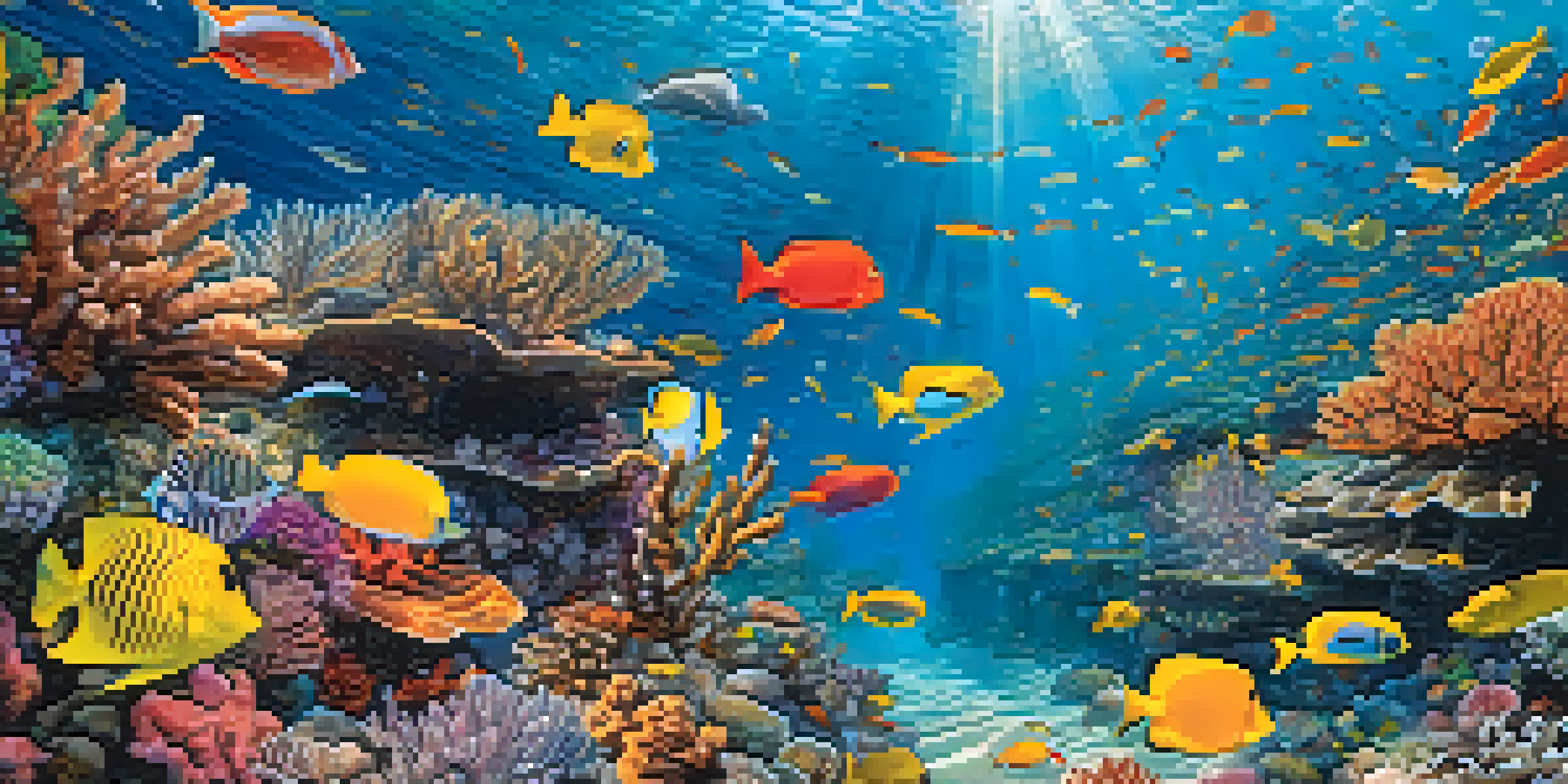Adventure Learning: Traveling for Unique Educational Growth

What is Adventure Learning and Why It Matters
Adventure learning is an educational approach that combines travel with hands-on experiences. It allows learners to engage with new environments, cultures, and challenges while gaining practical skills. This immersive style of education can lead to deeper understanding and retention of knowledge compared to traditional classroom settings.
The best way to predict the future is to create it.
Imagine learning about marine biology while snorkeling in a coral reef or studying history by visiting ancient ruins. These experiences not only make learning enjoyable but also help students connect theoretical concepts with real-world applications. The excitement of adventure encourages curiosity and fosters a love for learning that lasts a lifetime.
Moreover, adventure learning cultivates essential life skills such as problem-solving, adaptability, and teamwork. As learners navigate unfamiliar environments, they develop resilience and confidence, which are crucial for personal and professional growth.
The Benefits of Traveling for Education
Traveling for educational purposes offers a unique set of benefits that can significantly enhance a learner's experience. Exposure to different cultures fosters empathy and understanding, allowing students to appreciate diversity. This cultural immersion can broaden perspectives and challenge preconceived notions, promoting critical thinking.

Additionally, traveling helps develop global citizenship. Students learn to navigate complex social issues by engaging with local communities and understanding their challenges and triumphs. This experience encourages them to become active participants in the world, equipped with knowledge and compassion.
Adventure Learning Enhances Retention
This immersive educational approach combines travel with hands-on experiences, leading to deeper understanding and knowledge retention.
Finally, adventure learning can spark creativity and innovation. New environments stimulate fresh ideas, and the challenges faced during travel encourage out-of-the-box thinking. This blend of creativity and education not only prepares students for academic success but also for the complexities of the modern world.
Adventure Learning in Practice: Real-Life Examples
Many educational institutions have embraced adventure learning, incorporating travel into their curricula. For instance, some schools organize trips to ecological reserves where students can study wildlife and conservation efforts firsthand. These experiences provide a deeper understanding of environmental issues than any textbook could offer.
Traveling – it leaves you speechless, then turns you into a storyteller.
Another example includes cultural exchange programs where students spend time with families in different countries. This direct interaction fosters language skills and cultural appreciation, enriching the educational experience. Such programs often result in lifelong friendships and networks that span across the globe.
Moreover, organizations like Outward Bound provide adventure-based learning experiences centered around teamwork and leadership. Participants face physical challenges, such as hiking or rock climbing, which encourage self-discovery and personal growth. These programs highlight the importance of experiential learning in developing well-rounded individuals.
Planning Your Adventure Learning Journey
When planning an adventure learning journey, it's essential to align the experience with educational goals. Consider what skills or knowledge you wish to gain and choose a destination that offers those opportunities. Research programs or organizations that specialize in educational travel to ensure a meaningful experience.
It's also important to consider logistics, such as budget, accommodation, and travel arrangements. Finding the right balance between adventure and comfort can contribute to a positive experience. Don't forget to look into safety measures, especially when traveling to unfamiliar locations.
Travel Fosters Global Citizenship
Exposure to diverse cultures during educational travel promotes empathy, critical thinking, and active participation in global issues.
Lastly, encourage reflection before and after the trip. Setting learning objectives beforehand can help focus the experience, while post-trip discussions can reinforce what was learned. This reflective practice is key to maximizing the educational benefits of your adventure.
Overcoming Challenges in Adventure Learning
Like any educational approach, adventure learning comes with its own set of challenges. One common hurdle is the unpredictability of travel—flights can be delayed, weather can change, and plans may not unfold as expected. It’s crucial to remain adaptable and view these challenges as opportunities for learning and growth.
Another challenge is ensuring that every participant is engaged and comfortable with the activities planned. Differing levels of physical ability or interest can create tension within a group. To address this, offering a variety of activities and encouraging open communication can help ensure everyone feels included and valued.
Lastly, the emotional aspect of adventure learning cannot be overlooked. Traveling to new places can evoke a range of feelings, from excitement to anxiety. Preparing participants for these emotional ups and downs can help them navigate their experiences more effectively, ultimately leading to a richer learning journey.
The Role of Technology in Adventure Learning
In today's digital age, technology plays a significant role in enhancing adventure learning experiences. Tools like mobile apps and virtual reality can provide pre-trip education, helping students understand what to expect and how to prepare. This technology can bridge the gap between traditional learning and immersive experiences.
During travel, technology can also facilitate communication and documentation. Students can use smartphones to capture their experiences through photos and videos, creating a digital portfolio of their adventure. Sharing these experiences on social media or blogs not only enhances learning but also inspires others to embark on their own educational journeys.
Technology Boosts Learning Experiences
Digital tools enhance adventure learning by facilitating preparation, documentation, and remote collaboration, enriching the overall educational journey.
Additionally, technology can support remote learning opportunities, allowing students to connect with peers from around the world. Virtual exchanges can complement travel experiences, enriching the educational process by fostering international collaboration and understanding.
The Future of Adventure Learning in Education
As the educational landscape continues to evolve, adventure learning is poised to become an integral part of curricula worldwide. With an increasing emphasis on experiential learning, more schools and organizations are recognizing the value of travel as a tool for education. This shift reflects a broader understanding of how diverse experiences contribute to holistic development.
In the future, we may see more partnerships between educational institutions and travel organizations, creating structured programs that prioritize educational outcomes. These partnerships can provide resources, expertise, and support to ensure that adventure learning is accessible and effective for all students.

Ultimately, the goal is to create a generation of learners who are not only knowledgeable but also empathetic and engaged global citizens. The combination of adventure and education has the potential to transform how we learn, making education a thrilling journey rather than just a destination.